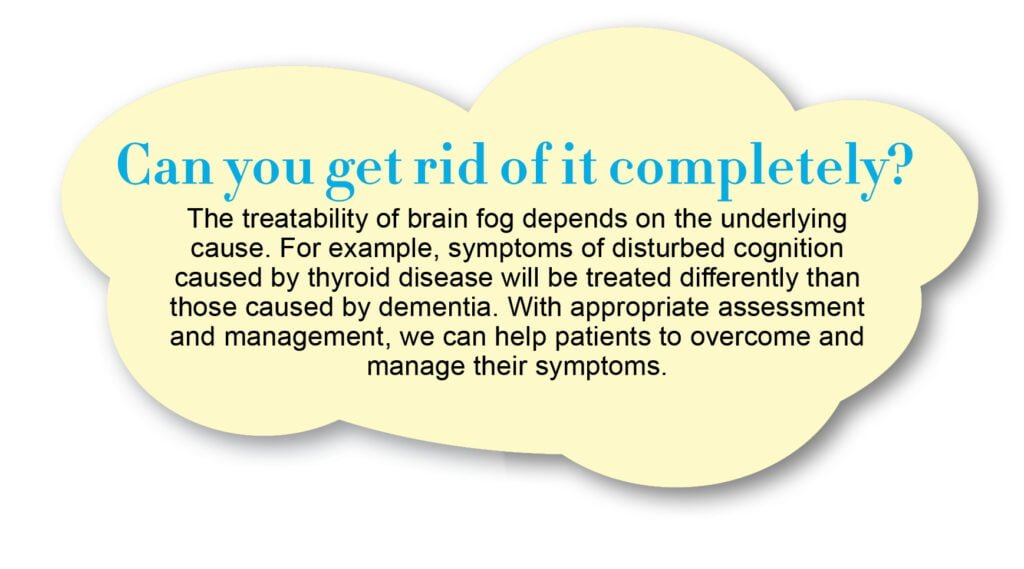- Sponsored Content

We’ve all had moments when we’ve forgotten what we walked into a room for, the point of what we were talking about mid-story, and people’s names, but sometimes our ‘brain fog’ seems a little more serious. Dealing with forgetfulness and a lack of focus can be a freaky feeling, and one that’s not only linked to ageing and the menopause, but more recently as a symptom of Covid-19. Dr Trisha Upadhyaya from Osler Health International shares insights and highlights when to be concerned.
What exactly is brain fog?
Brain fog is a lay term and not a medical diagnosis. It’s also known as ‘cognitive disturbance’ and can be described with symptoms including:
- Difficulty concentrating
- Forgetfulness
- Inability to focus
- Slower thinking or not thinking as sharply as usual
- Mental fatigue or mental haziness
You may experience some or all of the symptoms above at the same time, depending on any underlying health and medical conditions, or due to underlying neurological inflammation. The key thing to consider is the chronicity of these symptoms. The more longstanding the symptoms have been, the greater the degree of underlying neuro-inflammation there may be.
What causes it?
There can be several causes behind cognitive disturbance. These include:
- Lack of sleep
- Poor nutrition
- Stress – both physical and/or mental
- Alcohol, smoking or recreational drugs
- Medication
- Underlying medical conditions such as thyroid disorders, deficiencies in iron or other vitamins, viral diseases (such as Covid-19 and its prolonged effects), menopause, dementia, mental health conditions (depression, anxiety), stroke or heart-disease related conditions
Are certain people more predisposed?
Some research has shown that certain individuals may be prone to developing mild cognitive impairment in later life. Typically, these are people who may have a degree of neuroticism in their personalities, and whose approach to life and setbacks is with stress, anxiety and feelings of being overwhelmed. Identifying risk factors can help individuals and healthcare professionals in optimising their overall health and therefore lowering their risk profile.
How much does brain fog play a part in peri-menopause and menopause?
Symptoms affecting mental health such as mental fatigue, memory disturbance, and a lack of concentration are often experienced by women during the peri-menopause and menopausal phase. Brain fog can have a significant impact on a woman’s life, affecting her both personally and professionally. Some can often benefit from medication during this phase to help with symptoms of brain fog. If this sounds like you, make an appointment to speak further with a medical professional.
What’s the link between brain fog and Covid-19?
Post Covid-19 syndrome, otherwise known as long Covid, can present symptoms of brain fog. At this stage it’s still difficult to ascertain who may experience cognitive disturbance post infection and how much it may impact them. From the latest research, it appears that even those who may have had asymptomatic or mildly symptomatic disease can still experience post Covid-19 syndrome.
How do you know if your symptoms are more serious than ‘being forgetful’?
Most people will have occasional episodes of forgetting things – not many of us can remember what we had for lunch three days ago! However, if you find your absent-mindedness seems to have increased lately, or your family, friends or co-workers have noticed a change in your tendency to remember things or your behaviour, it may be worth seeking medical advice.

How do you medically diagnose brain fog?
When a patient complains of brain fog, we try to identify their symptoms and find out possible underlying causes behind them. Healthcare professionals can perform tests to gauge the degree of memory problems. The results can then be used to decide whether any further investigations need to be performed and/or what next steps an individual would benefit from.
For example, in somebody with low mood, tearfulness or anxiety, lack of concentration may be due to underlying mental health disorders. Similarly, if you’ve recently recovered from Covid-19 and you have new symptoms of mental exhaustion, slowness in your thinking or difficulty focusing, the brain fog may be due to the infection. Brain fog needs to be holistically assessed so specific treatment can be provided not only for symptoms, but also for any other potential underlying medical conditions.
Before medicine, what can you do to sharpen your mind?
The theory behind cognitive disturbance is that there may be some neurological inflammation present which impacts our regular cognitive functioning. The good news is that this inflammation can be reduced and improved by taking up certain practices in our day-to-day lives:
- Managing stress levels with regular exercise, meditation and mindfulness
- Adequate nutrition in our diet, so avoiding high-calorie, high-fatty foods. Some individuals may need to consider vitamin supplements
- Stopping smoking. Even casual smoking can affect multiple organs in our body, including our brains
- Monitoring alcohol intake and keeping to weekly limits or less
- Staying away from any recreational drugs or substances
- Maintaining social connections. The pandemic has shown us how isolation can negatively impact our mental and physical health, which takes a toll on our brain health
- Keeping our minds active through learning new skills, continuing our hobbies, and engaging in mental games such as Sudoku puzzles
It’s understandable that brain fog can feel a bit confronting, and your mind can rush to extreme places when it comes to a diagnosis. Most often, doctors can identify underlying causes and help you get back to your previous sharp and savvy cognitive form.
 Dr Trisha is a British trained family GP
Dr Trisha is a British trained family GP
based at Osler Health International. She is located in their Star Vista clinic.
osler-health.com
How can a GP help?
Find Osler Health clinics at 328 North Bridge Road, #02-27
Raffles Hotel Arcade, 188719 and
1 Vista Exchange Green,
#B1-27, The Star Vista,138617.
Email us at raffles@osler-health.com or starvista@osler-health.com








